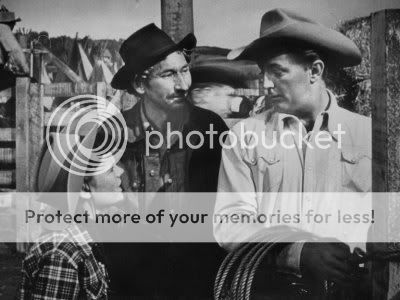 In The Lusty Men, Nicholas Ray anticipates the concise metaphor of the chicken run in Rebel Without a Cause with an entire two hours worth of suspense over a character’s choice to either jump early or ride to the death. It’s the fatalistic masculine ritual of the rodeo, and Ray explores it from several angles—thrill-seeking as metaphysical rush, danger-seeking as a quick route to fame and profit, and glory-seeking as male self-absorption. Robert Mitchum plays Jeff McCloud, a washed up rodeo star who partners up with Wes Merritt, played by Arthur Kennedy, a ranch-hand eager to make it big as a rodeo star himself. Susan Hayward plays his wife, Louise, in one of the most touching, understated female performances I’ve ever seen. Just about the only clearly thinking character the whole way through, Louise embodies Ray’s feminist leanings in her sympathetic foiling against the absurdity of macho ritualism. Ray never misses an opportunity to expose Wes for his misogynistic hypocrisy, lashing out at Jeff for mooching off his winnings while failing to acknowledge his own thankless dependence on his wife’s assumed domesticity and pleasuring himself with nightclub women without a blow to his conscience before hostilely confronting Jeff for kissing his wife.
In The Lusty Men, Nicholas Ray anticipates the concise metaphor of the chicken run in Rebel Without a Cause with an entire two hours worth of suspense over a character’s choice to either jump early or ride to the death. It’s the fatalistic masculine ritual of the rodeo, and Ray explores it from several angles—thrill-seeking as metaphysical rush, danger-seeking as a quick route to fame and profit, and glory-seeking as male self-absorption. Robert Mitchum plays Jeff McCloud, a washed up rodeo star who partners up with Wes Merritt, played by Arthur Kennedy, a ranch-hand eager to make it big as a rodeo star himself. Susan Hayward plays his wife, Louise, in one of the most touching, understated female performances I’ve ever seen. Just about the only clearly thinking character the whole way through, Louise embodies Ray’s feminist leanings in her sympathetic foiling against the absurdity of macho ritualism. Ray never misses an opportunity to expose Wes for his misogynistic hypocrisy, lashing out at Jeff for mooching off his winnings while failing to acknowledge his own thankless dependence on his wife’s assumed domesticity and pleasuring himself with nightclub women without a blow to his conscience before hostilely confronting Jeff for kissing his wife.If Wes is a brutish fame-seeker who becomes delusional about his rodeo skills and gambles away his winnings, then Jeff is harder to pin down, a wistful, tired-out man who exemplifies the lightly glimmering romance of the rodeo-circuit with all his failures behind him and who, like Dixon Steele and Jim Stark, desires some sort of family. He is seen at the beginning trekking in long shot through a rodeo graveyard and soon after goes to his childhood home in search of old belongings. It is one of my favorite Mitchum performances, confident and fragile and plaintive, and the ways Ray uses his depth of space to place him in various approximations to the other characters—triangularly in the context of Wes and Louise’s marriage and diametrically with Wes, his relationship to either ever in flux—gives the film an enrapturing formalism. The broader, poetic undertones erupt full-force when Jeff’s hard, masking exterior is shed to reveal his selfless, romantic motives and he rides off to a grand finish in a final spurt of his former glory—a heroic sacrifice, a tragic ode to what could have been between him and Louise, and a grand assertion of immortality.
“There never was a bronc that couldn't be rode, there never a cowboy that couldn't be throwed. Guys like me last forever.”
No comments:
Post a Comment